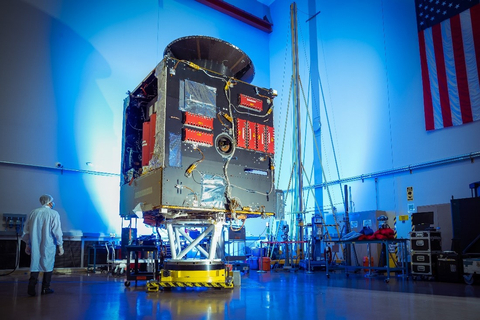CORRECTING and REPLACING NASA’s Psyche—Maxar Space Systems' First Deep Space Spacecraft— Performing Well After Launch
CORRECTING and REPLACING NASA’s Psyche—Maxar Space Systems' First Deep Space Spacecraft— Performing Well After Launch
PALO ALTO, Calif.--(BUSINESS WIRE)--All instances of Maxar Space in the release have been updated to Maxar Space Systems.
The updated release reads:
NASA’S PSYCHE—MAXAR SPACE SYSTEMS' FIRST DEEP SPACE SPACECRAFT— PERFORMING WELL AFTER LAUNCH
NASA’s longest mission to use commercial solar electric propulsion (SEP) is underway after launch earlier today. Maxar Space Systems, provider of comprehensive space technologies, built the unique spacecraft chassis based on the Maxar 1300™ series bus, the world’s most trusted space platform. The Maxar Space Systems-built Psyche chassis spread its two solar arrays and successfully started maneuvers toward the asteroid belt.
This Maxar 1300 spacecraft is one of the lightest and smallest ever, showing the versatility of the platform. Despite its small size, Psyche packs a powerful propulsion system for a one-way journey that will travel 2.2 billion miles (3.6 billion kilometers) throughout the life of the mission. In fact, it carries the largest load of Xenon ever aboard a spacecraft to help power its thrusters. The thrusters will use electromagnetic fields to accelerate and expel charged atoms, or ions, of that xenon. Expelling those ions will create the necessary thrust to move Psyche through space.
“Psyche will break records for deep space travel using SEP,” said Chris Johnson, CEO for Maxar Space Systems. “Maxar leads the industry in propulsion systems that use the Sun’s energy to keep a mission moving. Psyche’s propulsion system is three times as powerful as SEP systems on more than 40 spacecraft we’ve built, and we’re producing a more powerful version for the Power and Propulsion Element of NASA’s Gateway space station.”
Maxar was selected to provide the spacecraft platform for the Psyche mission under a firm-fixed-price contract. The Psyche spacecraft will travel beyond Mars to study a metal-rich asteroid in 2029, where it will spend 26 months orbiting and collecting data from its 140-mile-wide target. The Psyche mission is led by Arizona State University. NASA’s Jet Propulsion Laboratory, a division of Caltech in Pasadena, California, is responsible for the mission’s overall management, system engineering, integration and test, and mission operations.
In addition to Psyche, NASA will use the Maxar 1300 platform and SEP technology for the NASA Gateway Power and Propulsion Element under the Artemis Program. NASA’s other missions that use this platform include the OSAM-1 mission and the spacecraft that hosts the Tropospheric Emissions: Monitoring of Pollution (TEMPO) instrument.
About Maxar Space Systems
Maxar Space Systems is a leading provider of comprehensive space technologies. We deliver innovative solutions to government and commercial customers helping them unlock the promise of space to solve problems on Earth and beyond. We address a broad spectrum of needs for our customers, including mission systems engineering, product design, spacecraft manufacturing, assembly, integration and testing. Maxar Space Systems is a trusted partner in commercial and government missions, combining more than 60 years of deep mission understanding with reliable performance and longevity. For more information, visit www.maxar.com
Contacts
Eric Glass
Maxar Space Systems Media Relations
+1-650-512-4971
eric.glass@maxar.com
